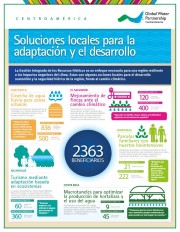 Two of the pilot projects implemented in the region are already demonstrating that the use of water management techniques in short term crops area instrumental to adapt to climate change.
Two of the pilot projects implemented in the region are already demonstrating that the use of water management techniques in short term crops area instrumental to adapt to climate change.
In Honduras, 21 farmers of a small community (200) that lives to the south of the capital city, learned how to apply a farming technique called “bio intensive gardening”, which produces better quality crops and uses water and fertilizers more efficiently.
In Costa Rica, an association of 9 small farmers of a community of 400 people, is using macro-tunnels which is another technology that allows a more controlled environment for growing vegetables. It also reduces the need for fertilizers, increases yields and is a more efficient system for irrigation. Both cases have gone through a first cycle of production, which have been sold at the local farmers market.
In El Salvador, farmers are now equipped with rain water harvesting systems for irrigation and they are using organic agriculture practices to produce vegetables in their plots. This project also established a group of local observers, as part of the municipal Early Warning System (EWS), since the region is prone to flooding from nearby rivers Angue and Ostua. This project has 120 direct beneficiaries who are part of a community of around 400 people.
The project in Guatemala benefited three schools and the surrounding community with the installation of rainwater harvesting systems, benefiting around 800 children and teachers, who now have access to safe water and a more hygienic environment in their schools.
In Nicaragua, 60 men and women of the community living in the Ramsar watershed of Nicaragua, “Sistema Lacustre Playitas-Moyúa-Tecomapa”, received capacity building workshops on sustainable farming, community tourism, climate change and IWRM. This site is now included as part of the touristic route promoted by the National Tourism Institute and an inter-institutional committee for the management of the Ramsar site has being integrated.
GWP Central America has produced a video and a series of briefing notes about these experiences. The long-term plan for the solutions is to be implemented in different countries to benefit the local community in the adaptation to climate change.
